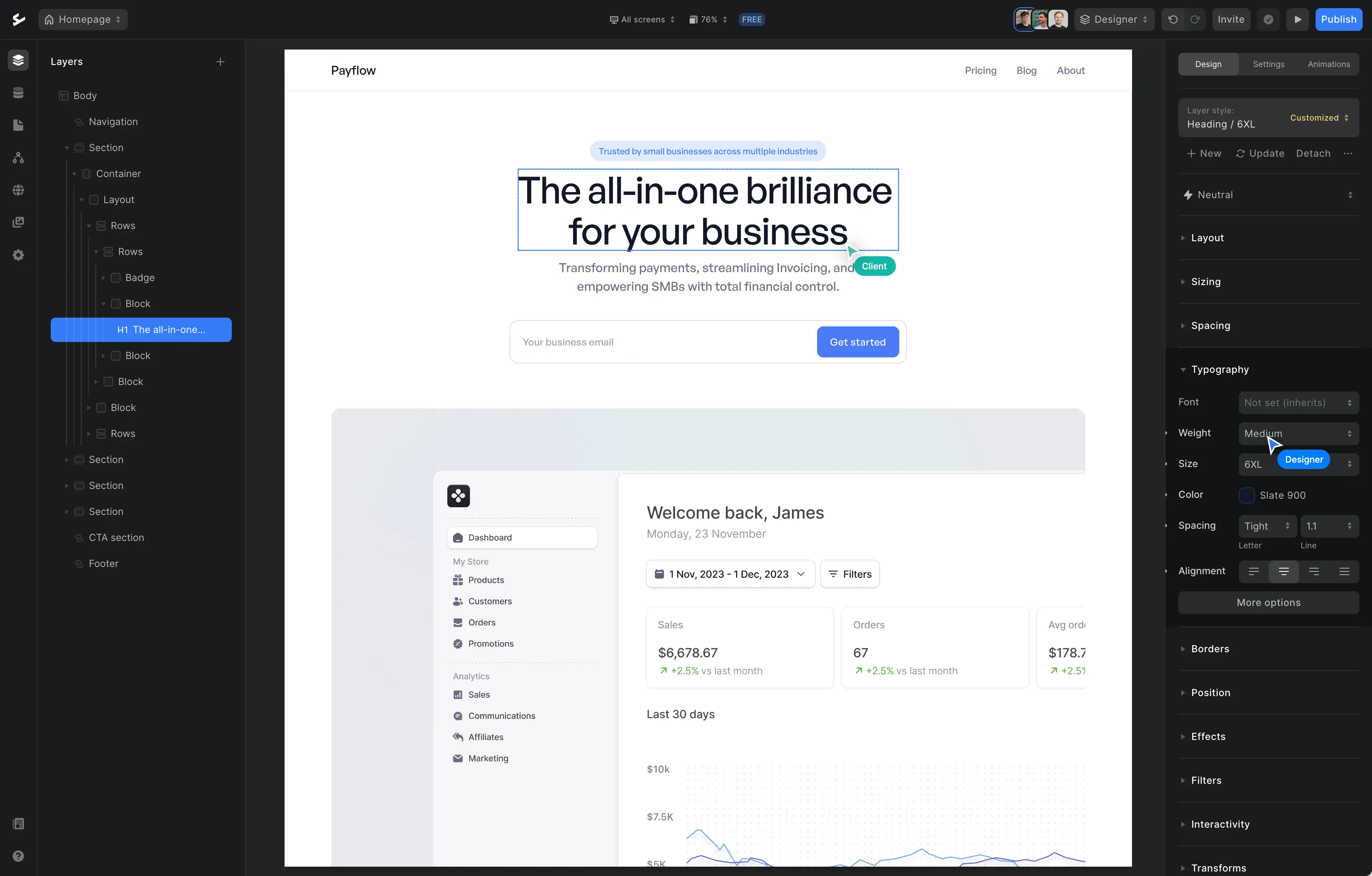
Forms are more than just tools for collecting email addresses—they're the backbone of efficient data collection and user interaction for businesses and individuals alike. Whether you're gathering customer feedback, processing registrations, or creating surveys, the right online form builder can streamline your workflow and improve user experiences.
With so many options available, finding the best form builder can be overwhelming. From no-code form builders to tools that integrate seamlessly with your website, each offers unique features to suit different needs. That’s why we’ve compiled a list of the top form builders to help you find the perfect fit for your project. And if you’re using Ycode, a powerful no-code website builder, you can create forms directly within your website, saving time and eliminating the need for external tools.
In this guide, we’ll explore the best online form builders of 2024, comparing their features, pricing, and ideal use cases. Let’s find the right solution to take your forms—and your workflow—to the next level.
Comparison of The Best Form Builders for Your Website in 2025
Ycode

Ycode is a no-code website builder that seamlessly integrates form-building capabilities, allowing users to create and manage forms directly within their websites.
Key Features:
Drag-and-drop form builder integrated into the website design process.
Supports data collection, filtering, and advanced forms.
Built-in CMS for dynamic content management.
User authentication forms for gated content.
Pros:
Unified platform for website and form creation, eliminating the need for third-party form builders.
Real-time updates and seamless integration with website content.
No coding required, making it accessible for non-developers.
Cons:
May have a learning curve for users new to no-code platforms.
Limited standalone form functionalities compared to dedicated form builders.
Google Forms

Google Forms is a free, user-friendly tool for creating simple forms and surveys, integrated within the Google Workspace suite.
Key Features:
Various question types, including multiple-choice and dropdowns.
Real-time response tracking with Google Sheets integration.
Customizable themes and basic branching logic.
Pros:
Completely free with no premium tiers.
Easy to use with seamless integration into the Google ecosystem.
Cons:
Limited design customization and advanced features.
Lacks integrations with non-Google services.
Jotform

Jotform is a versatile form builder offering a wide range of templates and advanced customization options.
Key Features:
Over 10,000 templates for various use cases.
Advanced conditional logic and payment integrations.
Mobile-responsive forms with offline data collection.
Pros:
Extensive template library accelerates form creation.
Robust customization and integration capabilities.
Cons:
Free plan has limitations on submissions and storage.
Some advanced features require higher-tier subscriptions.
Typeform

Typeform specializes in creating conversational forms that enhance user engagement through interactive design.
Key Features:
Conversational interface with one question per screen.
Customizable design elements and logic jumps.
Integrations with various third-party applications.
Pros:
Engaging user experience increases response rates.
Visually appealing and mobile-friendly forms.
Cons:
Higher pricing compared to some competitors.
Limited question types in the free version.
Zoho Forms

Zoho Forms is part of the Zoho suite, offering a comprehensive form builder with extensive integration options.
Key Features:
Drag-and-drop builder with customizable themes.
Approval workflows and task assignments.
Native integrations with Zoho apps and third-party services.
Pros:
Seamless integration with the Zoho ecosystem.
Generous free plan with essential features.
Cons:
Some advanced features are exclusive to higher-tier plans.
User interface may feel dated compared to newer tools.
Microsoft Forms

Microsoft Forms is a straightforward form builder integrated with Microsoft 365, suitable for basic data collection needs.
Key Features:
Real-time collaboration and response analysis.
Integration with Excel for data export.
Customizable themes and branching logic.
Pros:
Included with Microsoft 365 subscriptions.
User-friendly interface with quick setup.
Cons:
Limited advanced features and integrations.
Not ideal for complex form requirements.
Paperform

Paperform allows users to create forms that resemble landing pages, offering a unique approach to form design.
Key Features:
Rich text editor for versatile content creation.
Payment integrations with Stripe, PayPal, and Square.
Customizable themes and templates.
Pros:
Visually appealing forms that function as standalone pages.
Supports complex workflows and automations.
Cons:
Higher learning curve due to extensive features.
Premium pricing may be a barrier for small businesses.
Formstack

Formstack is designed for businesses requiring advanced data collection with a focus on security and compliance.
Key Features:
HIPAA-compliant forms for healthcare industries.
Advanced analytics and A/B testing.
Workflow automation and e-signature capabilities.
Pros:
Robust security features suitable for regulated industries.
Comprehensive form customization and integration options.
Cons:
Premium pricing reflects its enterprise focus.
May be overkill for simple form requirements.
Wufoo

Wufoo offers an easy-to-use form builder with a variety of templates and customization options, making it a good choice for users seeking simplicity.
Key Features:
Drag-and-drop interface with pre-built templates.
Payment processing integrations with Stripe, PayPal, and Authorize.Net.
Reporting tools for form analytics and data insights.
Pros:
Beginner-friendly platform with a quick learning curve.
Good selection of templates for different industries.
Integration options with major payment gateways.
Cons:
Limited advanced features compared to competitors.
Free plan is restrictive in terms of submissions and storage.
Formidable Forms

Formidable Forms is a powerful WordPress plugin for creating advanced forms directly on WordPress sites, suitable for developers and experienced users.
Key Features:
Drag-and-drop form builder with advanced customization options.
Calculated fields for complex form functionalities.
Integration with third-party tools like Zapier and Mailchimp.
Pros:
Seamless integration with WordPress for site owners.
Highly customizable forms for advanced use cases.
Strong community support and detailed documentation.
Cons:
Exclusive to WordPress, limiting flexibility for non-WordPress users.
Advanced features require higher-tier plans.
Cognito Forms

Cognito Forms offers robust features for creating complex forms with advanced calculations and payment integrations, making it ideal for businesses.
Key Features:
Conditional logic and calculated fields for dynamic forms.
Payment processing through Stripe and PayPal.
Embedded forms for easy integration into websites.
Pros:
Excellent value for the price, with a feature-rich free plan.
Intuitive interface for creating advanced forms.
Ideal for businesses needing calculations or payment processing.
Cons:
User interface feels slightly dated compared to modern tools.
Some advanced features are locked behind premium tiers.
SurveyMonkey

SurveyMonkey specializes in creating surveys and forms for data collection and analysis, ideal for research and feedback gathering.
Key Features:
Extensive library of question templates and surveys.
Advanced reporting and analytics for data insights.
Branching and logic features for customized survey paths.
Pros:
Trusted platform with a strong focus on survey quality.
Excellent analytics and reporting tools for actionable insights.
Supports integration with tools like Slack and Salesforce.
Cons:
Pricing can escalate quickly for larger teams.
Limited customization for non-survey forms.
Airtable Forms

Airtable’s form functionality allows users to collect data directly into Airtable databases, making it a great option for data organization.
Key Features:
Form submissions populate directly into Airtable grids.
Drag-and-drop customization for creating forms.
Collaboration features for shared team access.
Pros:
Combines form creation with robust database management.
Excellent for organizing and analyzing data.
Integrates seamlessly with Airtable’s broader ecosystem.
Cons:
Not a dedicated form builder, so customization is limited.
Requires familiarity with Airtable’s interface for full utilization.
Ninja Forms

Ninja Forms is a popular WordPress plugin for creating forms, offering a range of extensions for added functionality.
Key Features:
Drag-and-drop form builder with customizable fields.
Extensions for payment processing, email marketing, and more.
Integrates with major tools like Zapier and Constant Contact.
Pros:
User-friendly interface with a plugin model for flexibility.
Affordable for basic forms with optional add-ons.
Strong community and support for WordPress users.
Cons:
Limited features without paid extensions.
Exclusive to WordPress, reducing accessibility for non-WordPress users.
123FormBuilder

123FormBuilder is a versatile platform offering a variety of templates and integrations for creating forms, surveys, and quizzes.
Key Features:
Over 1,900 templates for different industries and use cases.
Integration with tools like Google Drive, Salesforce, and Dropbox.
Multi-language support for global audiences.
Pros:
Extensive template library for quick form creation.
Integrates with a wide range of third-party applications.
Supports multiple languages, enhancing accessibility.
Cons:
Advanced features locked behind higher-tier plans.
Limited design customization compared to competitors.
Conclusion about The Best Form Builders for Websites
When it comes to building forms, there’s no shortage of tools to choose from. However, many solutions require third-party integrations or exist separately from your website, adding unnecessary complexity to your workflow. Ycode stands out by combining the power of a no-code website builder with integrated form-building capabilities, allowing you to design, manage, and embed forms seamlessly within your site—all without writing a single line of code.
With Ycode, you get the flexibility to create dynamic forms that connect directly to your website’s content and functionality. Whether you’re collecting customer inquiries, building user registration forms, or gathering newsletter subscribers, Ycode ensures a smooth, cohesive experience for both you and your audience. The result? More efficiency, better engagement, and a website that truly works for you.
If you’re searching for a top form builder that integrates effortlessly with your website and offers advanced customization, Ycode is your answer. Say goodbye to juggling multiple tools and hello to a streamlined, all-in-one solution.
Ready to build better forms and elevate your website?Sign up for Ycode today and see how easy no-code website and form building can be!
Get your project started today
Discover our intuitive visual editor, use built-in CMS collections, SEO features and launch your web projects with ease.

